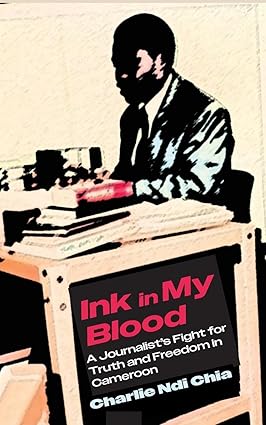There are people to whom you don’t say “No”. To me Charlie Ndi Chia is one of them. I have known him over the years, as adolescents in Victoria, now Limbe, and as colleagues working for CRTV.
Charlie’s human qualities are compelling; his gentleness, his kindness, and his joviality reassure at the first contact; but they are like a veil covering the steel dormant in him. When his values are flouted, Charlie can pack a punch and when he hits you, you stay down both literally and figuratively.
As a young man in his early twenties, Charlie worked for a number of newspapers in Victoria. In fact the number of newspapers published in Victoria at the time earned the town the name of “the Fleet Street” of West Cameroon journalism. There were towering figures of the Anglophone press like Tataw Obenson, aka Ako Aya, Gerome and Sylvester Gwelem, Wem Mwambo (I certainly forget others), but there was also Charlie Ndi Chia.
After the death of Ako Aya Charlie accepted the mantle of leadership; to step into the mighty shoes of Ako Aya. He became the editor of Cameroon Outlook newspaper. This is when he began running a column in the newspaper, which he called “Ink in My Blood”. Ako Aya had run a column called “Glimpses”, a gossip column of leery societal deeds and misdeeds.
Charlie’s column, “Ink In My Blood” was a different ball game. It was not about gleeful gossips. Instead it was a muscular column, fiercely critical of both the local administration, government policy and its actors. This earned him a turbulent history of arrest, detention, torture and deprivation by the administration and especially by the dreaded secret services, reputed for their coldblooded brutality.
The book we are launching today is named after that column. It tells the story, in his own words, of Charlie’s professional career, from a carpenter dreaming to build ships to a crusading journalist, both of the private press and of the official media.
When Charlie gave me a copy of the book and the honour to be a reviewer at the book launch, I started reading his narrative. The first lines of his prologue are powerful and thought-provoking… “As I sit here today reflecting on my long and eventful career in journalism, I am filled with a mix of emotions: pride, gratitude, frustration and even a touch of sadness. I have witnessed firsthand the transformative power of the media, its ability to hold those in power accountable, to give voice to the voiceless, and to shape the course of history.”
What follows in the next 112 pages of the book is a dialogue (in one of the most favoured journalistic formats, the Q&A, that is the Question and Answer format) between Grandchild and CNC. Of course we know the initials CNC are for Charlie Ndi Chia, but who is this anonymous Grandchild? I believe this could be anyone making their first faltering steps into journalism or anyone in the wider public interested in knowing the hurdles and pitfalls of the practice of journalism in Cameroon.
It is quite significant that Charlie resurrects the spirit and letter of his old newspaper column as a title for his memoir.
It demonstrates continuity of purpose with regards to his critical perspectives on government and public accountability. This highlights his commitment, over four decades, to these core values.
It also portrays how he has remained consistent over time, especially with the thematic consistency between his past and present work, which without compromise, have held those in power accountable; a core principle of a free press.
Re-using the title is, in my mind, also a symbol of his professional journey, demonstrating how his experiences and writings have been intertwined throughout his career; a career that resonates with the idea that a robust and free press is crucial for the functioning of democracy.
Ink In My Blood is no doubt a cornerstone of public discourse, providing original insights and proposing rules of engagement that should inspire the new generation of journalists, and several other generations to come.
While this book shall be found a worthy and instructive read by the general public I believe its target audience is media professionals seeking insights into the challenges and rewards of the profession, students of journalism and communication interested in the role of the media in society and anyone interested in the history of the press in Cameroon.
In conclusion, Ink In My Blood is a compelling read for anyone interested in the power of journalism to shape society. Charlie’s story is a reminder of the importance of a free press and the need for journalists to uphold the highest standards of their profession.
Eno Chris Oben, Buea 15.05. 2025, presented in Bushu Hall, CUIB, on 17.05. 2025

